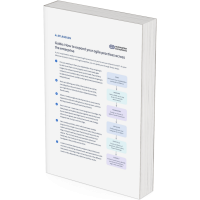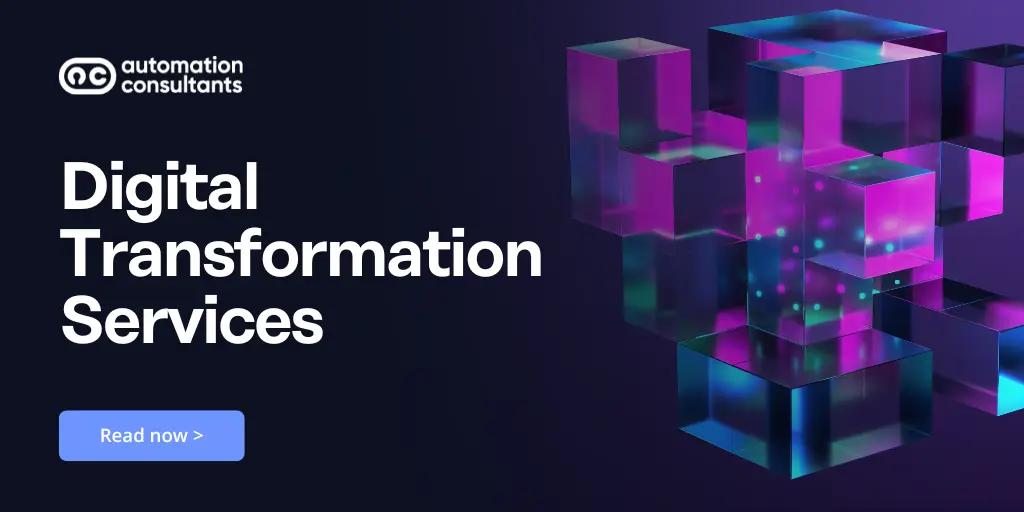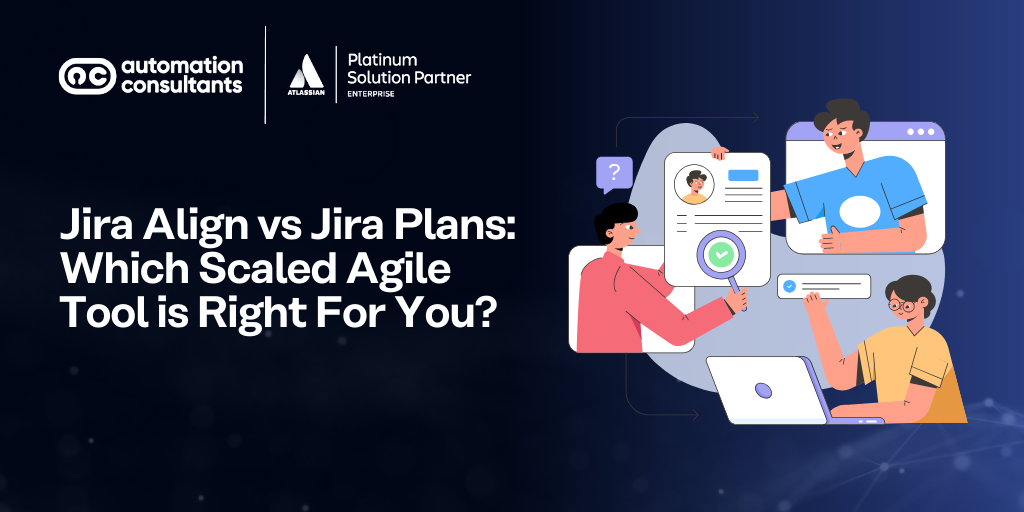Digital transformation can often sound like jargon – a term bandied about with little meaning.
However, when new processes and tools are embedded thoughtfully, sustainably and successfully, organisations truly can transform (and we don’t use that word lightly) the way they operate.
The way we work is evolving. Fast. Digital transformation strategy can help your organisation navigate these changes, keep pace with (or overtake) your competitors, and exceed (rather than simply meeting) your customers’ expectations.
But what exactly are digital transformation services? It’s a broad term, and can encompass so many aspects of the way teams work together, produce outcomes and respond to change.
In this post, we’re going to:
Explore the concept of digital transformation and what this means for organisations like yours
Share customer success stories of similar projects and their outcomes
Share examples of our digital transformation services and how we can support you with your evolution
Setting the scene
At a high level, a digital transformation project is where digital technology is integrated or enhanced across an organisation, ultimately changing (and hopefully improving) how you operate and deliver value to your customers.
In reality, however, it’s more than just adopting new tools and systems.
What is digital transformation?
True digital transformation involves re-evaluating business models, processes and customer interactions to align with a ‘digital-first’ approach. Crucially, it also requires a change in mindset across your teams, and may result in a significant cultural shift for your organisation.
Key components of digital transformation strategy
Every digital transformation project that we deliver is unique, as each one depends on an organisation’s objectives, industry and requirements.
However, most have the following elements in common.
Process transformation: We often focus on using digital tools to enhance the efficiency and effectiveness of an organisation’s processes – and sometimes we’ll totally redesigning those processes. We’d always recommend embedding clear KPIs and success metrics, so you can identify the long-term value of your new processes and/or techstack.
Domain transformation: You may seek to enter new markets or change your existing offering in some way. Now, often this is a key driver for digital transformation projects, as organisations want to unlock new opportunities through enhanced processes or technology. It may not be as significant as entering an entirely new area of business, but could relate to diversification or expansion.
Cultural transformation: In our experience, shifting mindsets is one of the most crucial elements to get right. Very few people like change – particularly when they feel it has been mandated or forced upon them. Engaging hearts and minds is a key component of business transformation programmes.
Ready to discover more? Find out how we transformed the working practices of a major broadcast television network. Through a multi-layered Agile transformation project, we consolidated tooling across 50 teams, embedded a bespoke Agile framework, and performed a number of complex migrations to Jira Cloud.
How to manage change successfully
We’ll come back to the broader topic of digital transformation shortly, but it seems like a good time for a brief detour to successful change management.
Whilst the scope of a digital transformation project can be vast, with multiple tools, migrations, working practices and frameworks to consider, the people piece is often the most challenging.
Now, context is important here. The drivers behind a change will often determine how positively team members accept and adapt to new ways of working. But even when change is positive, it can be met with reticence.
The key is engaging team members, from senior stakeholders to engineers on the ground, as early as possible.
The importance of managing expectations
During a recent conversation with our in-house Atlassian trainer, Cedric Oglesby, we discussed how to navigate resistance to change. With most of his career spent delivering training within Fortune 500 companies, Cedric has helped organisations to navigate the period after a transformation project.
He shared some guidance based on his two decades of experience in this field.
You tend to see issues arise when people are not informed. You see them questioning, ‘What’s going on?’ And that uncertainty can lead to people not feeling safe at work, not secure in their roles and day-to-day processes.
When I was working at a major banking group, I supported a project where the client was introducing Agile to a large division of the business. When it came to training users on the new tooling, it was a hostile crowd! Some didn’t even know what Agile was. You could see some people totally shutting down. They hadn’t had their expectations managed.
In this particular example, I started at the very beginning. We were going to build this new tool together and it was going to belong to them. They were the experts - some of them had been at this bank for 20-30 years. I encouraged them to use that experience to influence how we built the system to suit their needs - whilst also configuring it to meet the new Agile processes that had been embedded, and wider organisational objectives.Cedric Oglesby, Trainer at Automation Consultants
Are you preparing to embark on a large-scale project or complex programme delivery? Our highly experienced senior team possess exceptional skill and experience in complex, large-scale projects, ensuring you’re in safe hands. From strategic Cloud transformation to mergers and acquisitions, discover the difference with Automation Consultants, and allow us to guide you to a successful outcome. Discover more.
What is driving digital transformation?
In recent years, we’ve noted an increase in enquiries for digital transformation services – and we know we’re not alone in that. As technology continues to evolve rapidly and customer expectations continue to rise, many organisations are questioning whether there are better, faster and more secure ways of working.
From our perspective, we’ve recognised the following contributing factors in the rise of digital transformation projects:
The COVID-19 pandemic
It’s inescapable, even four years later: The impact that COVID had on workplaces across the globe is still being felt.
For many organisations, the pandemic accelerated the need for digital transformation, forcing businesses to adapt rapidly to remote work, digital customer experience and supply chain disruptions.
Companies that embraced digital transformation were better positioned to navigate these challenges and maintain operational continuity. And it’s a lesson for organisations in the future: That the ability to pivot quickly is essential.
Agile working practices, cohesive techstacks and integrated processes can all contribute to an organisation being in a strong position to adapt and change course quickly – and a digital transformation project is likely to embed or facilitate many of these.
Increasing competition
Whether you’re in a service or product-led market, you’ll know all too well that competition is only growing stronger. We’ll talk about customer expectations in the next section, but it’s worth a mention here – as they’re continually increasing, and organisations need to find new and innovative ways to meet them.
With a global economy, 24/7 expectations and a race to adapt, evolve and thrive, organisations are increasingly seeking ways to differentiate themselves. Alongside this will be cost and operating pressures, as organisations try to find ways to become leaner and more efficient.
Digital transformation can enable this kind of innovation, whether that’s achieved through the adoption of new technology, new processes, new markets or new structures.
Evolving customer expectations
Take a moment to think about your last interaction with a business. We imagine you expected (and hopefully received) a personalised, responsive and, ultimately, seamless experience.
This level of service is becoming the norm – so the pressure is on for organisations to find new ways to elevate their service offering. No matter which market, audience or sector, this is a non-negotiable.
Digital transformation services, like the ones that we provide, can equip businesses with the mindset, tools and processes to rise to this challenge more effectively. From analytics to automation, organisations can experiment, innovate and explore.
Advancements in technology
We’ve talked a great deal about change in this piece so far.
Artificial Intelligence (AI) is the obvious point to mention here, but organisations may also find themselves needing to respond to changes such as the growth of Cloud computing (a strong example of this is when tech vendors choose to prioritise or invest in Cloud over other hosting options – such as Atlassian’s decision to focus on a Cloud-first future, and inspire a wave of Cloud migrations).
Again, when faced with these kind of challenges or drivers, organisations should explore digital transformation and the results it can achieve for them.
At a glance: Benefits of digital transformation
We’ve already touched on some of the reasons why organisations pursue a digital transformation project – but what positive outcomes could you expect to achieve?
Operating processes, speed to market and product/service offering will be competitive
You’ll in a stronger position to respond to change swiftly
Improved efficiency and productivity
Increased customer satisfaction and subsequent retention
A culture designed to encourage and facilitate innovation
Greater agility
Guide: How to expand your Agile practices across the enterprise
Is your organisation ready to expand Agile practices but you're not sure where to start? Download the guide to find out the key steps.
What do digital transformation services look like at AC?
Like many of our fellow consultancies who have enjoyed a long career, we’ve witnessed seismic shifts in technology and ways of working over the last two decades.
With this experience and perspective, we’re ideally placed to guide you through a digital transformation project. Add in a team of highly skilled, knowledgeable and certified consultants, alongside our sought-after credentials delivering complex and large-scale programmes to household names across the globe and, well. You probably know where we’re going with this.
Automation Consultants has the skills, quality and proven track record to guide you through your own bespoke digital transformation process.
So, what does this actually look like?
What approach should you look for?
As we mentioned at the top of this piece, digital transformation is a broad term, and may encompass process redesign, tooling optimisation and moving away from one way of working to another.
It sounds like a cliche, but each organisation really is unique. As such, business transformation consultancy services should be too – tailored to your own needs.
From our perspective, we base our approach to digital transformation on the following core principles:
People are at the centre of everything
Regardless of how powerful your technology or how well-optimised your processes, without the buy-in of your people, a transformation project is unlikely to deliver a successful outcome.
After all, your people are going to be the ones using the new tools, or adopting the news ways of working you’ve embedded.
Now, it can take more than a few briefing sessions and training workshops to bring your teams on board. In our experience, it’s crucial to engage with people from day one. And this applies to stakeholders across all levels of your organisation – from the C-Suite to engineers on the ground.
We have tried and tested methods to work with your teams. Ahead of any business process redesign or tooling shift, it’s essential to understand that some people are going to have reservations about proposed changes – and that some may be downright resistant to change. Our job is to help you navigate the breadth of responses you may encounter throughout your project, and to guide you through the period of change for best results.
Identify pain points first
A successful digital transformation project hinges on making your tools and processes better. To solve your problems, we have to understand your challenges first. Once we truly understand your drivers for change, pain points and blockers, we can then focus on the solutions.
We gain the maximum insights and value of this stage in the process, we encourage our clients to participate in workshops and discussions with our team, to truly dig into those pain points.
Processes before tools
In our book, tooling should almost always be the final stage of your transformation.
Now, in most projects you’ll already know which technology you wish to embed. You might be migrating from one system to another, or perhaps making the leap from manual processes to a digital platform.
But the configuration and approach to that tooling should be informed by your people and processes. Rather than making you conform to a certain way of working within a tool, we start by understanding your drivers for change, pain points and objectives.
With our two decades (and counting!) of experience, we can then configure and embed your tooling to best address these challenges, fit your processes and deliver long-term success.
And, for those organisations who have truly unique processes, regulatory requirements or simply want to do things a little differently, we’re no strangers to thinking outside of the box, providing bespoke frameworks and solutions.
In closing
A transformation project is no minor undertaking.
We’d always encourage organisations who are considering a complex project to expect real change to take time. To navigate this potentially thorny period of change, it can be invaluable to employ the support and guidance of a dedicated consultancy.
Here at Automation Consultants, we have worked with household names to redesign their business processes, embed new technology and to adopt different ways of working.
To benefit from our years of experience and sought-after skill, do talk to us today. With a free consultation, you can share your needs, objectives and challenges with us in a free, 30 minute session, to help us understand more about your digital transformation project. We can then share some initial advice for next steps and recommend the approach we’d take.
Contact us today and book your free consultation with Automation Consultants
Whether you’d benefit from a free 30-minute consultation, or would like to learn more about our services, do reach out to us today.





